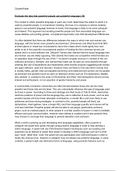Essay
A Level English Language: Language and Power A* Essay
- Institution
- AQA
This A-Level English Language AQA Essay covers the Language and Power topic of the course, and achieved an A*. The essay title is: 'Evaluate the idea that powerful people use powerful language'. This is perfect for Year 12 and 13 students currently studying AQA A-Level English Language.
[Show more]



